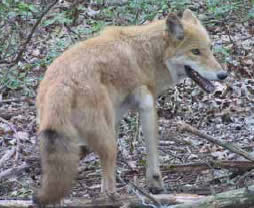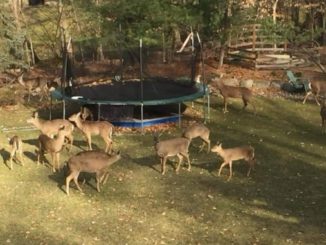
NEW JERSEY—Following an unusual outbreak of coyote attacks in New Jersey this year—including recently on Rutgers’ Livingston campus and two early October attacks in Mahwah’s Ramapo Reservation—state environmental and animal control officials are warning residents to be aware and take precautions around the animals.
Carol Tyler, senior animal control specialist for Tyco Animal Control, said the recent attacks in Mahwah and Piscataway where coyotes went after humans, were likely due to the coyotes being rabid.
However, she said, coyotes are also smart predators and warned residents never to feed wildlife—whether coyotes, deer, or bear—because then the animals become accustomed to being fed by humans, and associate people with food.
That often leads to disastrous, and harmful, encounters with humans as those wildlife seek food from people, she said.
Feeding wildlife harms the wildlife by making them reliant on humans for food, Tyler noted.
Conflicts ‘increasing yearly’
“These [coyote–human conflicts] are increasing yearly and it’s happening in all towns countywide,” Tyler said.
Her company handles animal control response for about two dozen towns, mostly in Bergen County.
She said North Jersey residents need to be “always aware” that coyotes are around in urban and suburban environments.
She noted coyotes have always been present in North Jersey but the availability of food from humans and wildlife learning to associate humans with food “has caused a dangerous situation to develop” including more encounters between humans and coyotes.
‘A dangerous situation’
“The wildlife is learning that we will feed them and this has created a dangerous situation that did not exist before,” she said.
While she said North Jersey children are more likely to be attacked by a neighbor’s dog than a coyote, she urged residents to always be aware of their surroundings when walking dogs or allowing dogs out in the yard.
“People should just use caution, knowing coyotes are around, and when you walk down the street be aware of surroundings,” Tyler said.
She advised residents to carry a whistle or small can air horn to scare off any possible coyote threats.
“The loud noise will stop their intent to do you harm,” she said.
Tyler said an increasing population of coyotes, and coyote-human interactions, is a growing countywide concern that should be best addressed via a county wildlife management plan.
Earlier this year, Pascack Press/Northern Valley Press asked county Parks and Recreation Director James Koth about such a plan and was told that it would need to wait at least until completion of an ongoing Bergen County Parks Master Plan.
Attacks ‘considered rare’
Following the mid-November coyote attacks on Rutgers’ campus, a state environmental protection official noted coyotes comprise a statewide concern and while attacks are “considered rare” all residents need to be proactive and aware.
“Be vigilant if you have children or pets and live in or near a wooded area. Coyotes may see small pets as prey and go after them,” wrote Caryn Shinske, a DEP public information officer.
She said people encountering an aggressive coyote should make a lot of noise, throw a rock or object to distract it “or make it known its presence isn’t welcome,” she added.
She said if an aggressive coyote appears, try to enter a safe space such as a car or house until it leaves.
‘Potentially be ill’
“If the coyote shows a lack of fear that means it has either become too accustomed to humans or it could potentially be ill,” Shinske said.
Other measures to minimize coyote-human encounters include covering all garbage cans and securing lids; immediately clean up spilled seeds from bird feeders, which can attract mice and rodents, and in turn, may attract larger predators such as coyotes.
In addition, she said motion-detector lights, which trigger due to movement, may help scare nuisance wildlife away.
“Education of the public is very important, and that’s happening all the time,” Tyler said.
She said many towns are taking a proactive role to get out information to residents about not feeding wildlife and what to do when encountering aggressive coyotes, or wildlife.
She suggested concerned residents check out the state Division of Fish & Wildlife website for more information.
The site provides biological background on the state’s Eastern Coyote and offers a dozen tips to reduce coyote conflicts.
Suggestions include not leaving any pet food outdoors, putting away bird feeders at night, clearing brush and dense weeds to minimize cover for small animals that coyotes prey on, and removing fallen fruit and covering compost piles to eliminate food sources.
New Jersey DEP fact sheet:
• Coyotes have been documented in each of New Jersey’s 21 counties, and in both urban and suburban areas
• Coyote attacks are considered rare.
• Be vigilant if you have children or pets and live in or near a wooded area. Coyotes may see small pets as prey and go after them.
• If you encounter a coyote and/or it seems aggressive, make lots of noise, throw a rock or other object to distract it or make it known its presence isn’t welcome.
• If you are near your vehicle or house, enter the car or go indoors until the coyote disappears.
• If the coyote shows a lack of fear, that means it has either become too accustomed to humans or it could potentially be ill.
• Do not leave garbage cans uncovered—a potential food source for coyotes and other wildlife.
• Immediately clean up any spilled seeds from bird feeders as the seeds attract mice and other rodents which, in turn, may attract coyotes.
• Consider installing motion detector lights in your yard. Movement will trigger the lights, which then may scare wildlife away.



